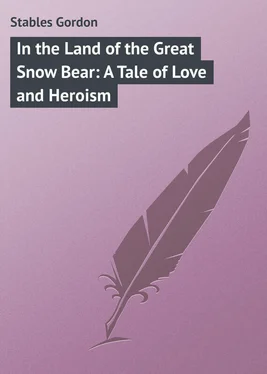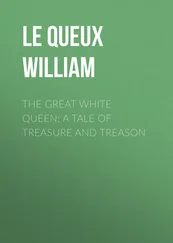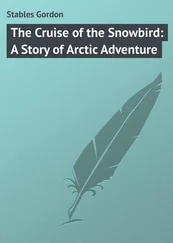Gordon Stables - In the Land of the Great Snow Bear - A Tale of Love and Heroism
Здесь есть возможность читать онлайн «Gordon Stables - In the Land of the Great Snow Bear - A Tale of Love and Heroism» — ознакомительный отрывок электронной книги совершенно бесплатно, а после прочтения отрывка купить полную версию. В некоторых случаях можно слушать аудио, скачать через торрент в формате fb2 и присутствует краткое содержание. Жанр: Прочие приключения, foreign_prose, на английском языке. Описание произведения, (предисловие) а так же отзывы посетителей доступны на портале библиотеки ЛибКат.
- Название:In the Land of the Great Snow Bear: A Tale of Love and Heroism
- Автор:
- Жанр:
- Год:неизвестен
- ISBN:нет данных
- Рейтинг книги:3 / 5. Голосов: 1
-
Избранное:Добавить в избранное
- Отзывы:
-
Ваша оценка:
- 60
- 1
- 2
- 3
- 4
- 5
In the Land of the Great Snow Bear: A Tale of Love and Heroism: краткое содержание, описание и аннотация
Предлагаем к чтению аннотацию, описание, краткое содержание или предисловие (зависит от того, что написал сам автор книги «In the Land of the Great Snow Bear: A Tale of Love and Heroism»). Если вы не нашли необходимую информацию о книге — напишите в комментариях, мы постараемся отыскать её.
In the Land of the Great Snow Bear: A Tale of Love and Heroism — читать онлайн ознакомительный отрывок
Ниже представлен текст книги, разбитый по страницам. Система сохранения места последней прочитанной страницы, позволяет с удобством читать онлайн бесплатно книгу «In the Land of the Great Snow Bear: A Tale of Love and Heroism», без необходимости каждый раз заново искать на чём Вы остановились. Поставьте закладку, и сможете в любой момент перейти на страницу, на которой закончили чтение.
Интервал:
Закладка:
Suddenly he sprang half up in bed and listened intently, painfully.
He had distinctly heard some one in the room calling him. He could not be mistaken, and the voice seemed Meta’s.
“Claude! Claude!” cried the voice again, and his heart almost stood still for a moment as he saw a figure, which his imagination magnified a hundredfold, near the bed. “Claude?”
Next moment Alba, the snow-bird, alighted on his breast.
He slept soundly soon after this, but still when he appeared at breakfast he was so jaded looking and restless as to cause his mother considerable anxiety. He stoutly refused to see a medical man, however.
“It is nothing,” he laughed. “Nothing, dear mother, only slight fatigue. A sailor like myself thinks little of travelling a thousand miles by sea, yet dreads the rolling, jolting train.”
There was plenty to do and think about all day, well calculated to banish care. The villagers, the tenants, and neighbours all round were delighted to see the manly face and handsome figure of young Claude Alwyn once more among them, still accompanied by his pet – his spirit-bird, as the older cottagers had come to call it.
Then, although grouse were wild, there were hares in plenty, and fish in the river ready to be wooed by the gentle art of so true a fisherman as Claude Alwyn. And the walking exercise, through the heather hills, the fresh air, and the balmy breath of pine trees, never failed to refresh and invigorate him both in mind and body, so that he always returned to dinner buoyant and hopeful. But ever at the breakfast-table there was that weary look of carking care in his face.
He would go no further, however, in explaining it than confessing he did not sleep very well at night.
“It is the change,” he remarked, smiling, “from a hard mattress to one far too soft and luxuriant for a sailor. Besides, mother, I dare say I miss the motion of the ship.”
His mother only sighed softly.
There came to Claude one night a dream as vivid as any reality. He was back again in Iceland. He was gazing on the face and form of her whom he loved, though she did not seem to see him. She was seated on a hill-top, a favourite spot, where beside her he had often sat, when the fields beneath were green, the far-off sea an azure blue, when wild birds sang above and around them, and the perfume of wild flowers filled the summer air.
But snow was all over the landscape now, save where dark rocks jutted through the white, and the ocean, foam-flecked, dashed high over the beetling cliffs. Yes, there sat Meta, but oh! the sad, sad look in those beautiful eyes! She opened her lips and spoke at last.
“No, no, no!” she murmured; “he will never come again.”
He thought he sprang towards her, but she faded away like the mist from a geyser, and he was alone on the snow.
He slept no more that night. But he formed a resolve.
“No,” he said to himself, “I am not a man; not a drop of proud Alwyn’s blood runs through my veins if I hesitate longer. It is a duty I owe to my mother and to her to speak my mind. Yes, Meta, I will come back again.”
Were I an artist, I should delight in painting only beauty and peace: the fairest, holiest faces should be transferred to my canvas; the most smiling summer landscapes, the sunniest seas. But, alas! I am but an author, and no pen-and-ink depiction of life would be complete without the shade and shadow of sorrow.
I will not needlessly dwell on the interview that took place in the very room in which I am sitting writing now, between the proud Lady Alwyn and her son. Indeed, the interview was brief in itself: I have thus some excuse for being brevity personified in my description.
Pass we over, then, Claude’s introduction, his passionate declaration of love for Meta, his glowing panegyrics on her person and mind, and even the statement that only his regard for his mother and fear of hurting her feelings caused him to conceal the truth so long from her, and then we come to the dénouement .
“But, dearest mother, I now know and feel that your constant desire to do everything for my happiness will cause you to receive my Meta when I bring her home as my bride.”
If she had been silent till now, it was because she seemed as if thunder-struck.
“My boy,” she cried at last, “you are bewitched, or I am dreaming some hideous dream. Tell me it is all but an ill-timed joke. You are but a child – ”
“I am a man.”
“You have been deceived, put upon, tempted by a designing – ”
“Hold, mother, hold! Though the few words you have uttered sound like the death-knell to hopes I have fondly cherished, go no further: forget not yourself so far as to speak one word against my bride-elect, lest I forget I am your son.”
“My son? My son ?” exclaimed the proud Lady of the Towers almost tragically. “Oh! would I could forget it, or that your ship had sunk in the blackest depths of ocean, rather than you had lived to bring this disgrace on the noble house of Alwyn.”
“Enough, mother; I will hear no more. You have thwarted me in the dearest wish of my heart, you whose love for a son ought to have conquered family pride. You have thrust me from the halls of my ancestors. I go forth into the world of adventure. I will seek in ambition, in ceaseless change, the only possible balm for the sorrow I have in parting from you.”
He turned on his heel as he spoke. He strode down the hall and through the avenue; he looked neither to right nor left, and never once behind him. His mother watched him with clasped hands, with anxious eyes, and with prayers on her pale and quivering lips.
“Would he turn? Surely, surely he would turn.” But nay; the trees soon hid him from view – hid him, and lastly Fingal, who with tail and head bent low, as if he knew that sorrow had come, followed at young Claude’s heels.
“Widowed and childless!” These were her words as she sank apparently lifeless on the floor.
Janet, her maid, found her thus and lifted her gently on to the couch. But when memory came back, no words her maid could utter could give comfort.
“I forgive him, Janet,” she said, “as he will forgive me. It is fate. He may write, but he’ll never return: too well do I know the pride of the Highland Alwyns. But, but, dear Janet,” – here all the woman’s nature gushed out in tears – “Janet,” she sobbed, “poor Fingal – too – has – gone.”
Sorrow had fallen like a dark cloud on Dunallan Towers, a cloud that was deepened in its darkness when one morning Alba, the snow-bird, was missing. It was last seen flying listlessly around the great elm trees, then straight as lightning bearing northwards. It was Janet who saw it, and it seemed to say —
“I hear a voice you cannot hear,
That bids me not to stay;
I see a hand you cannot see,
That beckons me away.”
Chapter Six
“Grief is the Parent of Fame.”
Claude was miles away from home ere he noticed faithful Fingal trotting near him.
His first thought was to order him back, but this poor dog, as if reading his mind, crouched low at his feet, looking beseechingly up.
“ This is my home,” he appeared to plead.
Claude’s next thought was to take him back; his mother might even ere now have relented. But that Highland pride, which has been at once the glory and the curse of Auld Scotland, stepped in and forbade.
Young Claude went on.
“Grief,” says one of England’s greatest novelists – Lord Lytton – “is the parent of fame.”
This is so true! Many and many a grief-stricken, sorrow-laden man and woman in this world would faint and fail and die, did they not fall back upon work to support them. This is the tonic that sustains tens of thousands of sorely stricken ones, until Time, the great healer, has assuaged the floods of their sorrow.
Читать дальшеИнтервал:
Закладка:
Похожие книги на «In the Land of the Great Snow Bear: A Tale of Love and Heroism»
Представляем Вашему вниманию похожие книги на «In the Land of the Great Snow Bear: A Tale of Love and Heroism» списком для выбора. Мы отобрали схожую по названию и смыслу литературу в надежде предоставить читателям больше вариантов отыскать новые, интересные, ещё непрочитанные произведения.
Обсуждение, отзывы о книге «In the Land of the Great Snow Bear: A Tale of Love and Heroism» и просто собственные мнения читателей. Оставьте ваши комментарии, напишите, что Вы думаете о произведении, его смысле или главных героях. Укажите что конкретно понравилось, а что нет, и почему Вы так считаете.












